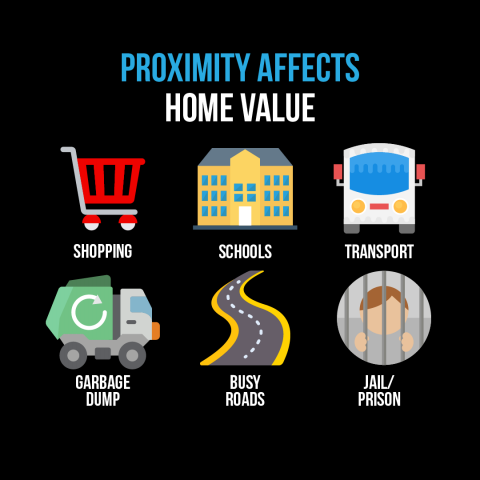Property Valuation
Key Learning Objectives:
Introduction: This section delves into the intricate process of property valuation in the real estate realm. Property valuation is pivotal for investors as it steers decisions about acquisitions, disposals, or refinancing. A confluence of factors, ranging from the property’s intrinsic attributes to broader market dynamics, shapes its value. Acquainting oneself with these variables and the methodologies to gauge them is indispensable for a successful investor.
- Grasp the Foundations of Property Values: Understand the underpinnings of property valuation, recognizing that the market value reflects the amount a knowledgeable buyer would pay a willing seller.
- Decipher Comparable Properties: Learn how to ascertain property value through the lens of ‘comparables’ or ‘comps’, emphasizing the significance of similarities in attributes and recency of transactions.
- Navigate Investment Property Analysis: Equip yourself with the tools to evaluate the return potential of a property, focusing on its income prospects, operational costs, and congruence with your investment strategy.
- Demystify Appraisals: Gain insight into professional property appraisals, acknowledging their role in delivering an objective valuation, and their importance in financial transactions.
Property valuation is the process of determining the market value of a property. This is a crucial step in the real estate investment process, as it helps investors make informed decisions about buying, selling, or refinancing a property. The value of a property is influenced by a variety of factors, including its location, condition, size, and features. Understanding these factors is key to accurately determining a property’s value.
Figure: The infographic underscores how proximity to certain amenities or establishments can influence a home’s value. Positive factors that can enhance a property’s value include its closeness to shopping centers, schools, and transportation hubs. Conversely, being near undesirable elements such as garbage dumps, busy roads, or prisons can negatively impact a property’s worth. Homebuyers and investors should consider these proximity factors when evaluating potential properties to make informed decisions.
Source: Custom Infographic

A. Understanding Property Values
To determine the value of a property, it’s important to understand how properties are valued. Property values are typically based on the property’s market value, which is the price that a willing buyer would pay a willing seller in a transaction. Market value is determined by a variety of factors, including supply and demand, the property’s location and condition, and economic factors such as interest rates and inflation. Other factors that can influence property values include zoning regulations, environmental factors, and local market conditions.
B. Evaluating Comparable Properties
One way to determine the value of a property is by evaluating comparable properties, or “comps.” These are properties that are similar in size, location, and features to the property being evaluated. By comparing recent sales of these properties, you can get a better idea of the market value of the property. It’s important to consider factors such as the property’s age, condition, and location when selecting comparable properties. Additionally, consider any unique features or factors that may affect the property’s value.

Figure: The infographic delves into a key term in real estate vocabulary: “Comparative Market Analysis” (CMA). A CMA is a tool utilized by real estate agents to assist sellers in determining an appropriate price for their property. It involves analyzing recently sold properties that bear similarities to the subject property. The emphasis is on ensuring that the properties compared are as alike as possible, ensuring a more accurate and apples-to-apples comparison.
Source: Custom Infographic
C. Investment Property Analysis
Investment property analysis is a process of evaluating the potential return on investment of a property. This involves analyzing the property’s income potential, expenses, and overall investment value. By considering factors such as rental income, vacancy rates, and operating expenses, you can determine the potential cash flow and return on investment of a property. This analysis can help you make informed decisions about the property’s investment potential and whether it is a good fit for your investment strategy.

Figure: The infographic provides a structured approach on how to evaluate a property before making an investment.
Key considerations include:
- Asset Type: Determining if the property is commercial, residential, or mixed-use.
- Business Plan: Recognizing that many assets come with a specific turnaround or investment strategy.
- ROI Potential: Ensuring that higher risks are balanced with higher potential rewards.
- Debt Allocation: Scrutinizing external loans to avoid unnecessary risks.
- Tenant Profile: Gaining insights into the tenant profile, rent roll, and other pertinent factors.
These evaluation criteria are essential for investors to make informed decisions and ensure the viability of their investments.
Source: Custom Infographic
D. Appraisals

Figure: The infographic introduces the term “Appraisal” from the realm of real estate vocabulary. An appraisal is described as a licensed appraiser’s assessment of a home’s market value, which is based on the recent sales of similar homes in the vicinity. For buyers, an appraisal is a crucial step in obtaining a mortgage, as it confirms the sales price for the lender. For sellers, a favorable appraisal is vital to ensure they achieve the best possible price for their property.
Source: Custom Infographic
Another way to determine the value of a property is through an appraisal. This is a professional assessment of a property’s value based on a variety of factors, including its location, condition, and features. Appraisals are typically conducted by licensed appraisers who are trained to evaluate properties and provide an unbiased assessment of their value. Appraisals are often required by lenders when obtaining financing for a property, but they can also be a valuable tool for investors to determine a property’s value.
In conclusion, property valuation is a complex process that involves evaluating a variety of factors to determine a property’s market value and potential return on investment. By understanding property values, evaluating comparable properties, conducting investment property analysis, and obtaining appraisals, you can determine the market value and potential return on investment of a property. It’s important to work with experienced professionals, such as appraisers and real estate agents, to ensure that you obtain accurate and reliable information about the property’s value. A thorough understanding of property valuation can help you make informed decisions about your real estate investments and minimize potential risks.
Key Takeaways:
Closing Statement: Property valuation stands as a cornerstone in the real estate investment landscape. A meticulous valuation process not only illuminates a property’s inherent market value but also charts its potential return trajectory. This section fortifies investors with a holistic understanding of valuation methodologies, promoting informed decision-making and risk mitigation.
- Core of Property Valuation: Market value, influenced by a medley of factors like location, condition, and broader economic indicators, captures the essence of what a property might fetch in an open market transaction.
- Power of Comparables: Identifying and analyzing similar properties – in terms of attributes and location – offers a realistic estimate of a property’s market value, emphasizing the need for relevant and recent comparisons.
- Investment Property Analysis Lens: Beyond mere valuation, understanding a property’s revenue potential, coupled with its expense profile, unveils its suitability within one’s investment portfolio.
- Role of Appraisals: Professionally conducted appraisals offer an impartial assessment of property value, making them invaluable for both financial transactions and investment clarity.
- Collaborative Approach: Enlisting the expertise of seasoned professionals, be it appraisers or real estate agents, can enhance the accuracy and reliability of property valuations. A nuanced understanding of property valuation principles not only enriches investment strategies but also safeguards against potential pitfalls.

